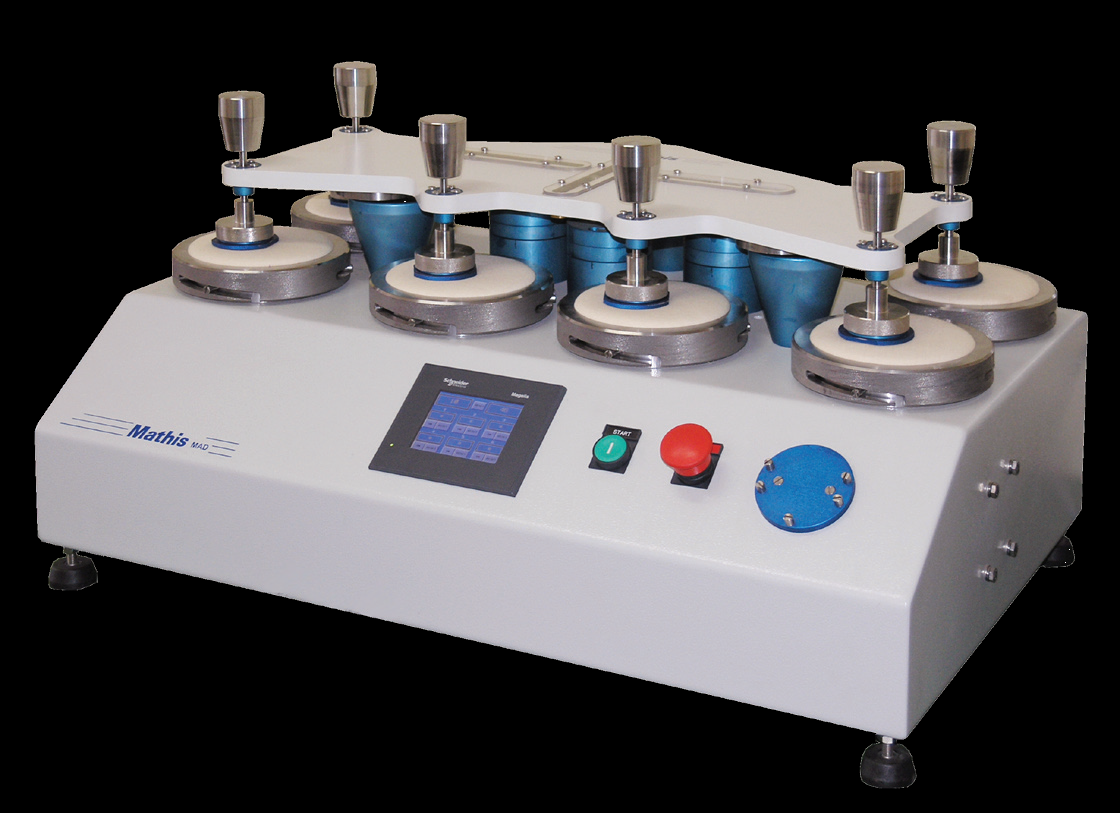Taber abrasion resistance test for coated upholstery fabrics
The Taber abrasion resistance test is a standardized method used to assess the durability of materials by simulating real-world wear and tear. For coated upholstery fabrics, this test measures how resistant they are to physical friction caused by repetitive rubbing or brushing actions. This service plays a critical role in ensuring that products meet quality standards for longevity and customer satisfaction.
The Taber abrasion resistance test is widely recognized and used across various industries including automotive, furniture manufacturing, and interior design. In the upholstery fabric sector, it helps manufacturers ensure their products can withstand high traffic areas such as living room seating or car seats without significant wear over time. By conducting this test, companies can make informed decisions about material selection, process optimization, and quality assurance.
During the Taber abrasion resistance test, a rotating wheel with abrasive strips rubs across the surface of the fabric specimen at controlled speeds and pressures until a specified number of cycles is reached or until visible signs of wear appear. The amount of weight applied to the wheel can be adjusted depending on the desired level of friction. After testing, the fabric's appearance (such as pilling) and physical properties (like thickness) are evaluated.
This service is particularly important for coated upholstery fabrics because these materials often combine a decorative layer with functional performance characteristics such as water resistance or stain repellency. The coating can affect how well the fabric resists abrasion, so testing this combination ensures that the final product meets both aesthetic and practical requirements.
The Taber abrasion resistance test provides valuable insights into the wear characteristics of coated upholstery fabrics under simulated conditions. This information is crucial for developers to understand potential issues before they become apparent in actual use scenarios. Additionally, it allows for continuous improvement through iterative design changes based on feedback from testing results.
For quality managers and compliance officers responsible for ensuring product performance meets regulatory requirements, the Taber abrasion resistance test offers a reliable way to verify that products are durable enough for intended applications.
Applied Standards
| Standard Reference | Description |
|---|---|
| ASTM D6041-18 | Absorption and retention of liquids by flexible cellular materials. |
| EN ISO 12947:2004 | Determination of the abrasion resistance of textiles using a Taber instrument. |
| ISO 6583 | Method for determining pilling resistance of textile fabrics and garments. |
| AATCC 129-2017 | Determination of the abrasion resistance of coated upholstery fabrics using a Taber instrument. |
Scope and Methodology
The scope of this service covers the application of ASTM D6041-18, EN ISO 12947:2004, ISO 6583, and AATCC 129-2017 standards for determining the abrasion resistance and pilling behavior of coated upholstery fabrics. The methodology involves preparing appropriate test samples according to industry best practices before placing them onto a specialized Taber instrument.
The process begins with selecting representative specimens that accurately reflect typical product characteristics. These samples are then mounted on the rotating wheel of the Taber machine, which applies consistent pressure and velocity during continuous rubbing against a specified abrasive surface. The test continues until either 10 million cycles or visible signs of wear appear, whichever comes first.
During testing, close monitoring ensures accurate recording of any changes in appearance due to pilling or other forms of damage. At the conclusion of each cycle, visual inspections are conducted to assess whether further rubbing is necessary based on observed results. Once completed, detailed reports summarizing findings are generated for internal use and external certification purposes.
The results from this testing procedure provide crucial data regarding the durability of coated upholstery fabrics under simulated conditions. This information enables manufacturers to make informed decisions about material choices, processing techniques, and quality control measures aimed at enhancing overall product performance.
Competitive Advantage and Market Impact
- Ensures compliance with international standards for textile testing.
- Demonstrates superior quality through rigorous evaluation processes.
- Provides valuable feedback on potential improvements needed to enhance product longevity.
- Supports strategic decision-making by offering comprehensive insights into material performance.
- Facilitates competitive differentiation by delivering exceptional durability standards for coated upholstery fabrics.
The Taber abrasion resistance test has a significant impact on the market as it helps establish credibility among consumers who value long-lasting products. By adhering to these stringent testing protocols, companies position themselves favorably against competitors offering less durable alternatives. Moreover, successful completion of this test can lead to increased sales and customer loyalty due to improved trust in brand reliability.





